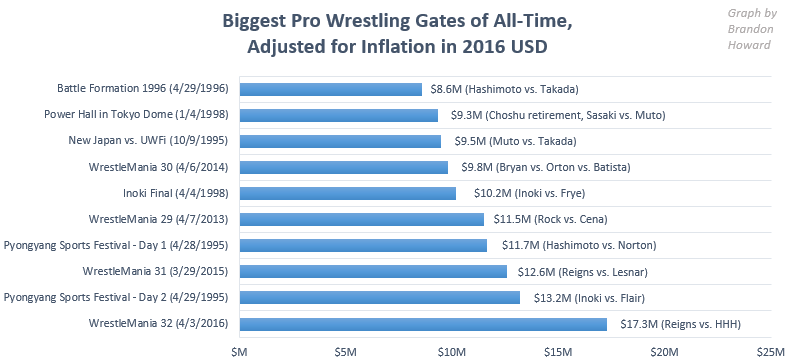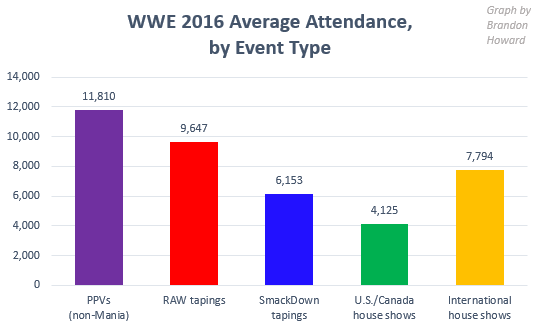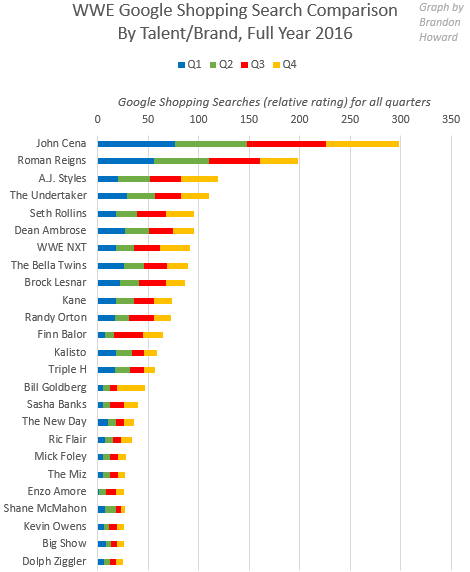EXCLUSIVE: Is Roman Reigns a Draw?

When Roman Reigns perches on the turnbuckle Sunday in Orlando he'll probably be showered with boos for the third WrestleMania in a row. He'll raise both his fists again and stare out into the crowd with his cool movie star eyes, surrounded by giant, very expensive LED branding, and 60,000 people will mostly reject him. They will recognize him once more as the personification of their frustration: that his boss, who rules the major league of pro wrestling, doesn't put on a show for them, but rather a strangely-languaged "ultimate thrill ride" for himself.
Vince McMahon stated on the most recent WWE investors' call that "there is no one talent that makes this big wheel keep on turning." Even if he's just a spoke on that wheel like the rest, surely Reigns should still draw a sufficient amount of interest in WWE to justify his spot; he should still be a stronger spoke than most. So is Reigns a positive difference-maker to WWE's business?
Reigns has main evented two of the biggest live gates in pro wrestling history: WrestleMania 31 in Santa Clara, California, and WrestleMania 32 in Arlington, Texas.

Maybe we should ignore the Pyongyang Sports Festival events (co-promoted by New Japan Pro Wrestling and World Championship Wrestling) referenced above since those in attendance were probably ordered to be there and the North Korean government collected most of the ticket money. In that case Reigns has been the main eventer of the two biggest shows ever, and by next Sunday, at WrestleMania 33, he'll have been a major player at probably the three biggest ever.
Barring major injury or incident, Reigns will be a top name going forward for WWE at high-ticket-price WrestleManias for years to come, which will almost certainly continue to challenge WrestleMania 32's record gate. Rumors about early plans for next year's Mania already slate Reigns main eventing against Brock Lesnar. On paper Reigns is going to have a tremendous resume as a headliner on the biggest shows ever.
In reality though the recent WrestleMania gates would have been just as high, with or without Reigns, and are more a reflection of how wrestling fandom has evolved and how peak events have become bigger than ever, even as WWE's popularity overall hasn't changed much.
"People can look at Roman Reigns and say, ‘The failed attempt that is Roman Reigns,’ but Roman Reigns sells tickets,” Paul Levesque told SI.com on Monday.
Levesque argued Reigns isn't a failed babyface but actually already a de facto heel to those who boo him, and therefore he doesn't have to be turned heel in the traditional sense. The WWE Executive Vice President didn't discuss whether the crowd heat Reigns gets is good heat or go-away heat, or whether the heat is actually directed at him or at the promotion.
At any rate, is Roman Reigns actually a live event attraction as company man Triple H says? Is Reigns a draw by that or any other metric?
The short answer is, relative to his peers currently in WWE, Reigns hasn't shown to be an attendance draw but probably is a merchandise draw, likely no. 2 behind John Cena in that latter category.
Few WWE talents are allowed the opportunity to make a difference to the company's business to the extent that we on the outside looking in can discern whether they matter, studying the data that can be scraped up publicly. Reigns has been afforded that opportunity by being placed as the headliner on house shows on his own tour, opposite a tour for Cena (when he's still on the road) or most any other talent who's been positioned as prominently
I looked at attendance reports collected from the Wrestling Observer Newsletter (thanks to Chris Harrington) for the years 2008 to 2016 in hopes of discovering any positive difference-makers to attendance during those years. It should be noted that the attendances collected from the Observer are mostly estimates, reported in numbers rounded to the nearest hundred. With this data I did a market-to-market analysis, which means I measured a given attendance compared to what the attendance was at other collected dates in that very city. It's often argued that some talents, namely Cena, are given the bigger markets to headline in so therefore of course their attendance performance would be superior to those who headline in the smaller markets. A market-to-market analysis should remove that problem. I also adjusted for the following factors:
- Whether John Cena (who's already demonstrated to be a strong positive difference-maker) was on the card. Since Cena is a proven draw, shows with him were inherently benefited.
- The month: house shows in months from December to March performed better than those not during those months.
- The year: house show attendance performed better in some years as opposed to others, and especially declined in 2016.
- The weekday: house shows on Friday and Saturday performed better than those not on those days.
- Holiday tours were discarded entirely. House show attendances from December 25 to December 31 in any year were especially high, probably due to tickets being bought as Christmas gifts, which doesn't necessarily reflect any individual's appeal as an attraction.
- We look at North American (U.S. and Canada) house show attendance only here. International house shows are more volatile as their markets are toured less frequently. TV tapings for RAW and SmackDown as well as pay-per-views have their own patterns of attendance that are higher than North American house shows. In fact the clearest difference-maker to WWE attendance is actually event type.

So when we adjust for all those factors and look at Reigns' track record on house shows so far in his career, what do we see?
Reigns has been a main eventer for the entire years of 2015 and 2016. In 2015, this analysis tells us Reigns made a -4% difference versus non-Cena house shows in the same market from 2008 to 2016; and in 2016, he made a -2% difference. Since these negative differences are small and since the attendances sourced are estimates, I don't think it would be fair to call Reigns a negative difference-maker. Obviously from this assessment he can't be called a positive difference-maker either.
No one, not even Cena, was a clear positive difference-maker to house show attendance in 2016 by this analysis, largely because house show attendance overall significantly declined for that year. Reigns actually performed better than Cena in 2016 in this analysis; Cena's limited house show outings weren't impressive. Other main eventers like Seth Rollins, Chris Jericho and Kevin Owens performed comparably to Reigns — by which I mean, the differences weren't big enough to conclude anyone is independently moving the needle.
Compare these minor, single-digit differences to Cena's record as a bona fide house show draw. Here's Cena's record (by the same analysis, controlling for the same factors) versus non-Cena shows for 2010 to 2015:
- 2010: +23%
- 2011: +35%
- 2012: +28%
- 2013: +39%
- 2014: +7%
- 2015: +14%
As the years go on with Reigns as a top name for WWE, a clearer track record for him as a house show draw should emerge, providing more evidence to determine whether he makes a positive difference to attendance, which remains to be seen.
Besides house show performance though, the study I did of Google Shopping searches for 2016 suggested Reigns moves merchandise better than anyone in WWE except for Cena. The study suggested Reigns is the clear no. 2 merchandise seller.

Granted this studied turned up dubious findings like suggesting Kane is a top 10 merchandise draw. The great distance between Reigns and everyone else but Cena, though, leads me to believe there's something to him as a top merchandise seller.
However one could always argue that Reigns' merchandise sales, provided he is actually the no. 2 seller, are a self-fulfilling prophecy thanks to the way he's positioned by WWE, and that maybe even more merchandise would be sold if the time and resources devoted to him were given to others.
We should remember WWE has real data. What we're relying on here is what's available publicly which, in this case, amount to reflections of the real data.
The company has access to actual merchandise sales numbers, actual attendance numbers, minute-by-minute TV ratings, data collected from the WWE Network and so on. And the company has an entire analytics department devoted to making sense of its metrics. So I think it's likely WWE has real data that supports how Reigns is being used, even if that data itself is subject to interpretation.
You can follow Brandon on Twitter @adecorativedrop. He can be reached by email at brandon@fightful.com





